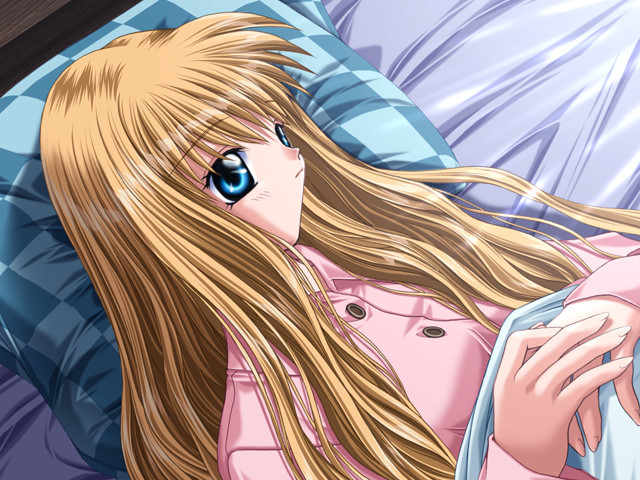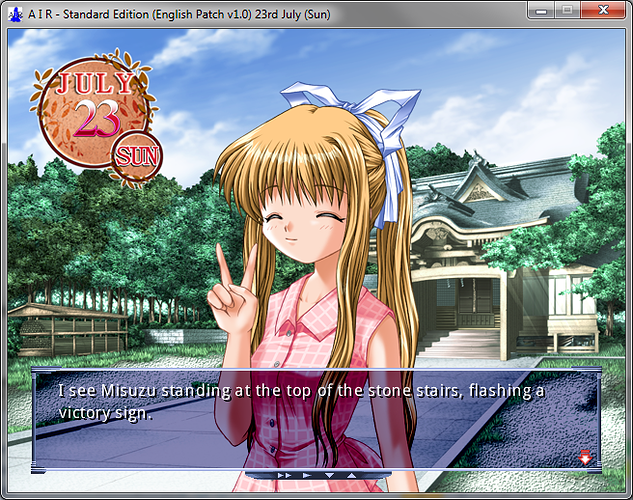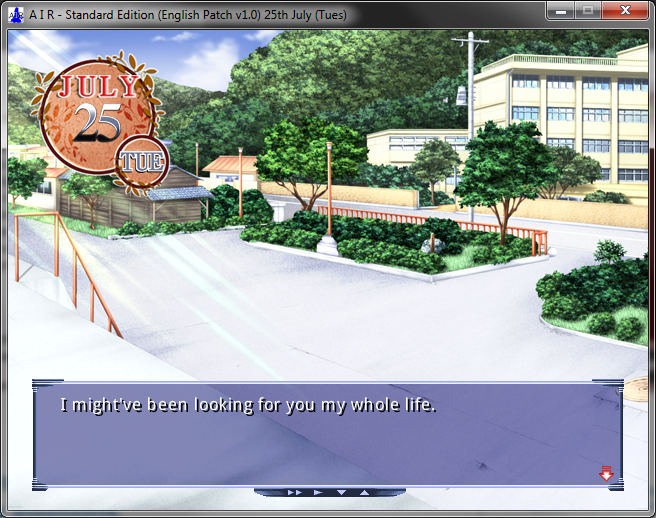When I first heard about AIR back in one of Arkada’s reviews, Misuzu was the only character I heard mention of by name besides Yukito. By the looks of it, she seemed to be the main focus of the story. I later learned that AIR had a different structure from Kanon and CLANNAD, so my suspicions were further backed by this evidence. From all the promotional art and small bits of anime footage that I saw, she seemed to have an air to her that she had this sort of ‘angel complex’ to her at first. When I first went through the common route, my expectations seemed too grand for this peach-juice-loving, childlike, super-optimistic high school girl. After playing through her route, I really noticed how deep Misuzu’s character really is.
Misuzu is a high school girl who dreams of flying, and desires to make at least one friend by herself. She is quite aware of the consequences, but she pushes on anyways. Yukito is probably the worst choice for a friend, due to his negative view of her and her habits. Still, she keeps pushing herself to make friends with this one individual who has almost nothing to help her with on the surface, but that’s really how you go about making friends, isn’t it? Smile, say hi, remember the person’s name, treat them how you would like to be treated yourself. Misuzu’s actions are a stunning example of how an ideal friend should behave, and it kind of makes me jealous of her social skills.
Her route is one of the shorter (and in my opinion, more tolerable) routes in the VN, but so much is accomplished in that short amount of time. Yukito and Misuzu’s chemistry in this is so well-developed; they grow to understand each other and look past each other’s faults without breaking character, and (should you choose not to view the sex scene) their romance is quite platonic and not forced at all. Also, Yukito learns a lot about his purpose in finding the girl in the sky, and we learn quite a bit about Yukito’s mother and why she sent him on this journey. The resolution of this route has quite a bit of Key Magic, but it’s executed rather well here. It led me to believe that this story is not quite over yet…
As far as religious symbolism goes, there’s quite a bit of it here. Misuzu is very obviously a parallel for Christ, not only in personality, but in circumstances. Christ had said in the New Testament that “…except ye be converted, and become as little children, ye shall not enter the kingdom of heaven.” (Matthew 18:4) Misuzu acts very childlike, in that she is faithful, hopeful and charitable to her friends and neighbors, and especially Yukito. Of course, that doesn’t mean she is childish. As @Pepe pointed out earlier, she does seem to have some common sense and knowledge about certain things, so she’s still very much an air-headed high school girl. The ‘impossible pain’ she feels later in the route can also be a parallel to Christ’s suffering in Gethsemane, where the impossibly-heavy burden of all the sins of the world was thrust upon him, “…and he sweat as it were great drops of blood falling down to the ground.” (JST Luke 22:44) Now, of course, Misuzu doesn’t bleed as she feels the pain of the girl in the sky, but her uncontrollable fits of crying seems quite similar to what Jesus said right before He suffered in Gethsemane: “Then saith he unto them, My soul is exceedingly sorrowful, even unto death: tarry ye here, and watch with me.” (Matthew 26:38) (Summer spoilers) Also, when you think about the all of the sad, painful memories of the people in the town (or maybe even the world) burdening Kanna, Misuzu’s pain isn’t too far off from having to carry the sins of everyone who has ever lived and ever will live on this earth.
In a sense, Yukito becomes Misuzu’s ‘apostle’ as a result, learning from her and becoming more devoted to her as he learns who she is and what is happening to her. Much like how Jesus’ apostles were the most unqualified people on the planet to be so, Yukito is not the best person to choose to be friends with initially. Jesus’ apostles grew to know who He is and why He was there, but they were more afraid for themselves and were not able to help Him much when He was taken and crucified. Yukito acts this very same way, believing that the only way to save Misuzu (and himself) is to separate himself from her. However, much like how a man closely associated with religion finds it hard to give up, Yukito returns to his goddess, and tries to save her with the power of faith (I know it says ‘wishes’, but wishes only work if a person has the faith to carry the wish out). I’ll go into more depth about what happens afterward when we start reading the AIR arc.
None of the character themes in AIR are more fitting for their respective characters than Natsukage is to Misuzu. The piece is light and upbeat, while at the same time having a bit of a sad air to it. It perfectly represents a childlike girl like Misuzu who is doomed to die, either alone or with her friends. Standing alone, it is also a beautiful composition that I’m sure even Maeda was proud of (he tried to compose a similar-sounding song for Little Busters, but it was dummied out of the final game).
Anyway, time to dump my Key Points:
Why does Misuzu call Yukito a tadpole? Is there any way this could be symbolic of Yukito’s personality or his journey to find the girl in the sky?
When Misuzu tells Yukito about her dreams slowly deteriorating her body, she says that after seeing her final dream, she will ‘become just like the girl in the sky’. Does that imply that the girl in the sky is dead, or does a different fate await Misuzu should she experience her final dream?
Why does Yukito call Shigemi Kawaguchi twice in the same route to be Misuzu’s friend? Is he desperate, or does he believe that she has the closest affinity with Misuzu since she is her classmate? Why couldn’t he just call some of her other classmates, like Minagi or Kano?
We all know the details of Misuzu’s condition and its effects on Yukito, but why does he feel pain in his back specifically? Did he injure himself there previously, or is it representative of his decision to stay with Misuzu?
Yukito’s mother mentions being with someone like Misuzu before, but had no idea how to save her at the time. It makes me wonder, could Yukito’s ancestors have found several different incarnations of the girl in the sky in the past? And if so, why is Yukito the only person who can save her? Couldn’t some of his ancestors do something about it?
Before Yukito leaves Misuzu, he points out that the cards in her hand symbolize her. In what way could the deck of cards be symbolic of Misuzu?
Good luck, @Yerian. XD
My final thoughts: Misuzu is a wonderful character with far more depth than she initially seems to have. Her relationship with Yukito is very natural and in no ways forced, and the pacing of her route is near-perfect. Her Christ-like parallels add so much depth and meaning to her route, and the AIR route only adds and expands to Misuzu’s story, but that’s for another thread.
(sigh) If only Rin’s route was as well-executed as this one…









 Though she did say that she only started having the dream once Yukito showed up, iirc. That might imply that Yukito is somehow special in some way beyond that… Perhaps he’s special because he wouldn’t leave her alone. (Although we’d have to ignore the other routes for that.) Hmm…
Though she did say that she only started having the dream once Yukito showed up, iirc. That might imply that Yukito is somehow special in some way beyond that… Perhaps he’s special because he wouldn’t leave her alone. (Although we’d have to ignore the other routes for that.) Hmm…